This article has been just updated: January 17, 2024
Online privacy is a very important topic, so it’s very likely that you’ve heard about VPN (Virtual Private Network) services and wondered what they do. Our goal with this article is to demystify VPNs and list some of the best VPN services that you can use to bypass internet censorship and hide your real IP address in 2024.
Don’t worry: you don’t have to be a seasoned network administrator or a hacker to protect your privacy online and maintain your data security. All you need is a reliable VPN service.
What Is a VPN?
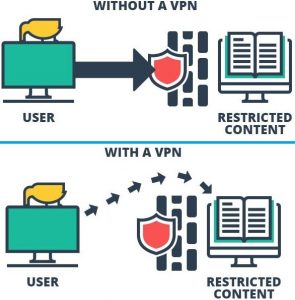
Imagine the internet as an open highway that we all share to browse the web, watch movies online, listen to music, send emails and instant messages, and play games with friends and strangers around the world. The open nature of the internet means that everyone can see what everyone else is doing—just like you can see other cars driving on the highway next to you.
Yes, some cars have tinted windows—just like some websites use HTTPS instead of HTTP to encrypt all communication between your browser and the website—but you can still see their license plates, which are akin to IP addresses attached to encrypted data packets.
How Does a VPN Work?
A VPN allows you to travel through your own tunnel that only you can access. Even though this tunnel extends over the public highway that is the internet, nobody can see what’s going on inside because it’s encrypted with the AES-256 encryption standard, which is approved by the National Security Agency for top secret information and military use.
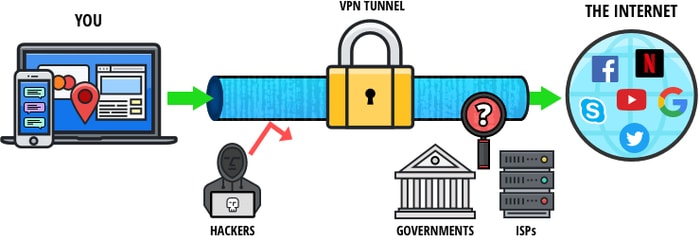
Is It Legal to Use a VPN?
In most countries around the world, including the United States of America, it’s perfectly legal to use a VPN service to access the internet anonymously. Unfortunately, there are a few countries that have decided to severely restrict or even downright ban the use of VPN services, including North Korea, China, Turkey, Iraq, United Arab Emirates, Belarus, Oman, Russia, Iran, and Turkmenistan.
Their reasons vary, but they usually have something to do with the desire of the government to keep taps on its citizens’ online activity. But just because you live in a country where VPNs are allowed doesn’t mean that you’re free to use them to illegal things. Anything that’s illegal without a VPN service remains illegal with one.
How Do I Choose a VPN?
There are probably hundreds of VPN services to choose from. While some VPN services target specific customers, such as those who are on a strict budget, most offer very similar features at very similar prices, making it difficult for people to know which VPN service they should choose.

We recommend you first pick a budget and then create a list of VPN services that fit into it. Then, compare their features, study online reviews, and see which payment methods they accept. Most VPN services today offer at least a 7-day trial or 30 days money-back guarantee, so it doesn’t matter all that much if the first VPN service you pick ends up not working out for you.
What Are the Best VPN Services in 2024?
To help you get started, we’ve picked the top 7 best VPN services available in 2024 based on online reviews, objective metrics, and our own experience with them.
1. NordVPN
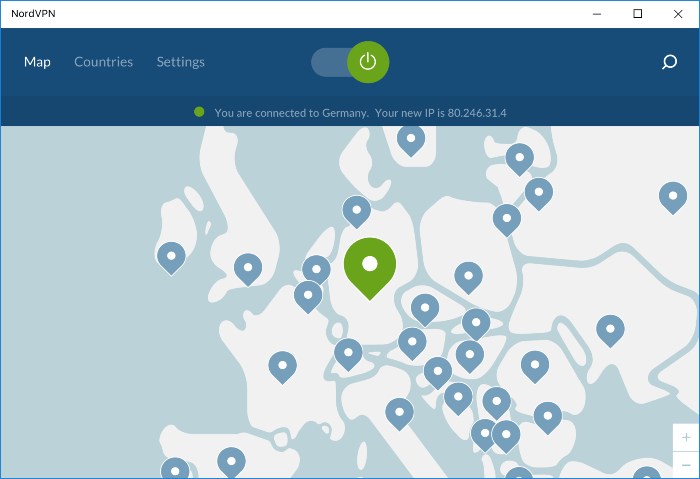
If you’ve never used a VPN service before, you should start with NordVPN. Not only is NordVPN extremely affordable but it lets you secure up to 6 devices at the same time, not to mention that it works on virtually every platform under the sun. NordVPN has a worldwide presence, allowing you to connect to more than 5,000 servers in 62 countries. NordVPN is contantly expanding and strengthening its infrastructure, and it stands behind its customers with a 30-day money-back guarantee.
2. VyprVPN
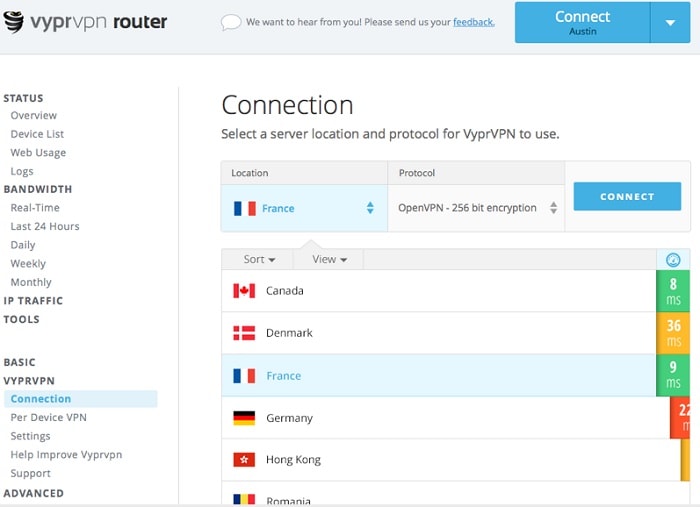
VyprVPN is one of the world’s most trusted VPN services, and it has even passed an independent no-logs audit that evaluated its data retention practices and found absolutely no problems. VyprVPN uses a proprietary anti-blocking technology called Chamelion VPN, which allows it to defeat VPN-blocking even in China and other countries where VPN services typically don’t work.
3. IPVanish
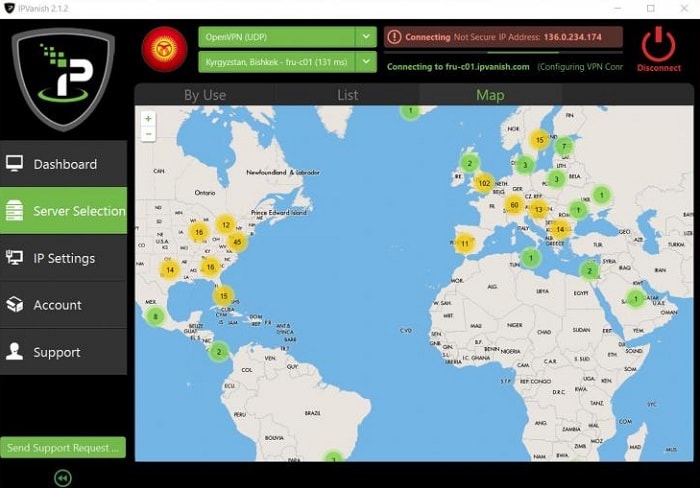
Not all VPN services allow peer-to-peer file sharing because of its high bandwidth demands, but IPVanish welcomes file sharing enthusiasts with open arms, offering fast speeds and online freedom at a price most people can easily afford. IPVanish provides unrestricted Internet access to every corner of the globe with its small army of more than 1,100 anonymous servers. The IPVanish app works on Windows, macOS, iOS, Android, Linux, Fire TV, Windows Phone, Chromebook, and some routers.
4. Buffered VPN
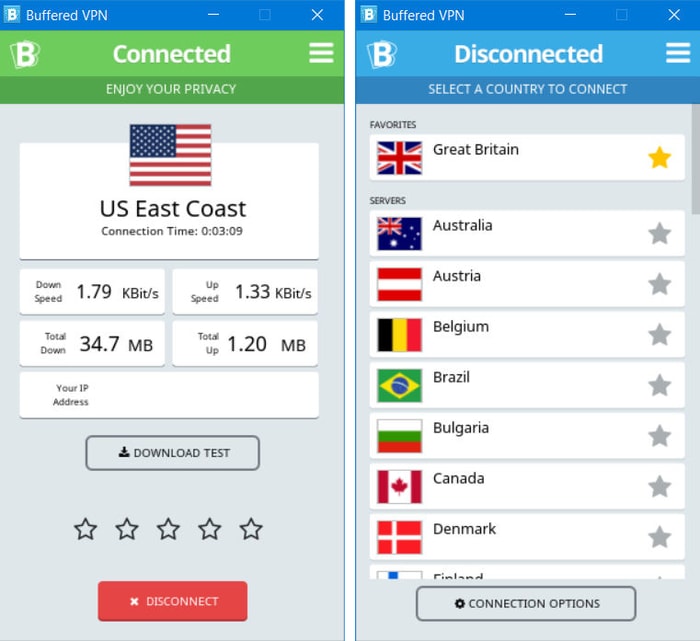
Buffered VPN gives you many reasons to choose it over other VPN services. For starters, it works on Windows, Linux, macOS, iOS, Android, and routers, so you can really get your money’s worth regardless of which operating system you use. Buffered VPN doesn’t apply any bandwidth restrictions, making it perfect for demanding users who want to anonymously enjoy the internet without any limitations.
5. ZenMate
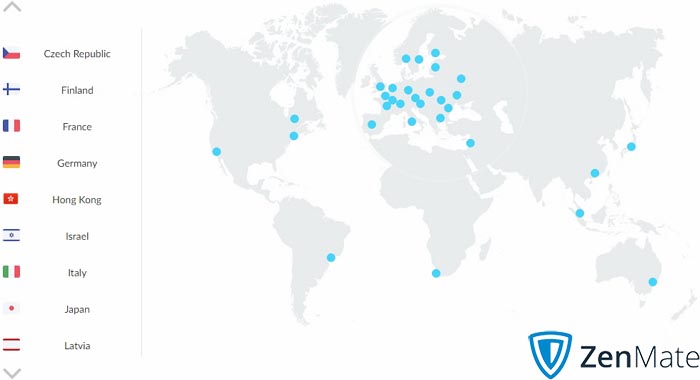
ZenMate is used by over 45 million users to access the web securely, anonymously, and without restrictions. The service starts at just €2.05 per month, and you can pay with PayPal, credit and debit cards, SEPA bank transfer, or UnionPay. ZenMate has servers in more than 30 countries, and it’s one of only a few VPN services that guarantee access to online streaming sites. If you find a website that doesn’t work as it should with ZenMate, you can ask for a generous discount against your next payment as an apology.
6. SurfEasy

SurfEasy is a no-logs VPN service that you can try for free before you become a paying subscriber. It uses a proprietary Ad Tracker Blocker algorithm to intercept cookies from advertisers to stop them from following you around the web. SurfEasy is one of the highest-rated VPN apps both in the Google Play Store and the Apple App Store, and the service itself is just as good.
7. TunnelBear
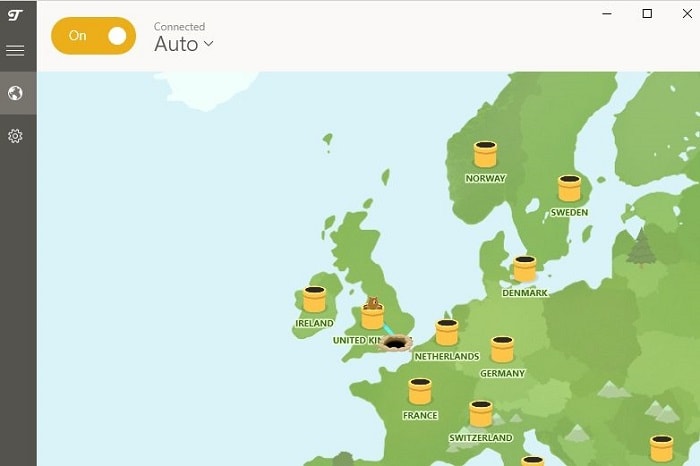
Conclusion
Not everyone is lucky enough to live in a country where online freedoms are respected and protected by law. Even those who are may wish to hide their real IP addresses and route all data through an encrypted tunnel to make it impossible for unauthorized third parties to monitor their online activity. Fortunately, modern VPN services such as NordVPN make it easy to connect to the internet anonymously with a click of button and from any device.
FAQ
What is a VPN and how does it work?
A VPN, or Virtual Private Network, is a service that encrypts your internet connection and routes it through a remote server, hiding your online activities and protecting your privacy. When you connect to a VPN, it creates a secure tunnel between your device and the internet, making it difficult for anyone to snoop on your data or track your online behavior.
Why would someone use a VPN?
Individuals use VPNs for various reasons, including to enhance privacy and security online, to bypass geographic restrictions on websites or streaming services, to avoid government surveillance, or to secure information while using public Wi-Fi networks.
Are VPNs legal to use?
In most parts of the world, using a VPN is completely legal. However, some countries with strict internet censorship have regulations against VPN usage or approve only government-sanctioned VPNs. It’s important to check local laws before using a VPN service.
Can you be tracked if you use a VPN?
While a VPN can significantly increase privacy, it does not make you entirely untraceable. Skilled hackers, determined governments, or the VPN provider itself may still be able to track you, especially if logs are kept of your activities.
Do VPNs hide your IP address?
Yes, VPNs hide your real IP address by replacing it with the IP address of the VPN server you’re connected to. This masks your identity and location, making it appear as though you’re accessing the internet from a different place.
What is the difference between a free VPN and a paid VPN?
Free VPNs may seem enticing but often have drawbacks like slower speeds, limited data usage, fewer server locations, and may have less stringent privacy policies. Paid VPNs usually offer better service, including faster connections, more server options, and a stronger commitment to user privacy.
How do I choose the right VPN service?
To choose the right VPN, consider factors like the provider’s reputation, privacy policy, the number of server locations, client software compatibility with your devices, speed, and customer service. It’s also a good idea to read reviews and maybe even take advantage of a trial period if offered.
Can I use a VPN on my smartphone?
Yes, most reputable VPN providers offer applications for both Android and iOS devices. Setting up a VPN on your smartphone usually involves downloading the app from the app store, signing in, and simply connecting to a server of your choice.
Does a VPN slow down internet speed?
A VPN can potentially slow down your internet speed because your data needs to travel further and is encrypted and decrypted. However, the impact is often minimal with a quality VPN service. Some users may not notice the difference, especially if they have a strong internet connection to begin with.
How do I set up a VPN on my computer?
Setting up a VPN on your computer typically involves subscribing to a VPN service, downloading and installing the provider’s app, and following their instructions to connect to a server. The process is user-friendly and doesn’t usually require advanced technical knowledge.
Are there any risks to using a VPN?
The primary risk in using a VPN is choosing a dishonest provider. Some VPNs may not properly secure your data or might even share it with third parties. Researching and selecting a trustworthy VPN service with a strong privacy policy is crucial to mitigate this risk.
Can I use a VPN for streaming geo-restricted content?
Yes, many people use VPNs to access content that’s restricted due to geographic licensing agreements. By connecting to a server in a different country, you can often bypass these restrictions and access a wider range of movies, TV shows, and sporting events.
Is there a quality difference in servers among VPN providers?
Yes, there can be significant differences in server quality among VPN providers. High-quality servers tend to offer more reliable connections, faster speeds, and better encryption. Providers with larger networks also allow for more options when looking to bypass geographical restrictions.
How many devices can use a VPN simultaneously?
The number of devices that can connect simultaneously varies from one VPN provider to another. Some offer a limited number of slots, while other VPN services, like NordVPN and ExpressVPN, may allow up to five or more devices on a single account.
What encryption protocols do VPNs typically use?
VPNs commonly use protocols such as OpenVPN, IPSec, IKEv2, and more recently, the faster and more secure WireGuard. These protocols govern how VPNs encrypt and transmit your data securely over the internet.
How can I ensure my VPN is running properly?
To ensure your VPN is running correctly, you can check your IP address before and after connecting to the VPN to make sure it changes. You can also use services that check for IP leaks or DNS leaks, which could expose your true location even when connected to a VPN.
Will using a VPN protect me from viruses and malware?
While a VPN does a lot to protect your privacy and encrypt your data, it doesn’t protect against viruses or malware. To safeguard against such threats, you should use a good antivirus program in conjunction with your VPN.
Do any browsers come with built-in VPNs?
Some browsers like Opera offer a built-in VPN feature. However, these built-in VPNs may not offer the full functionality of a standalone VPN service, such as access to numerous server locations and robust encryption protocols.
Can I still be affected by bandwidth throttling when using a VPN?
Using a VPN can help prevent bandwidth throttling, which is when your internet service provider deliberately slows down your internet based on what you’re doing online. Because a VPN encrypts your activity, your ISP cannot easily determine if you’re streaming, gaming, or engaging in other high-bandwidth activities, thus deterring throttling.
How do I know if a VPN provider keeps logs?
To find out if a VPN provider keeps logs, you should carefully read their privacy policy. Look for terms like no-logs policy or zero-logging, which indicate that the provider does not keep records of your internet activity. Additionally, some providers undergo third-party audits to verify their privacy claims.





